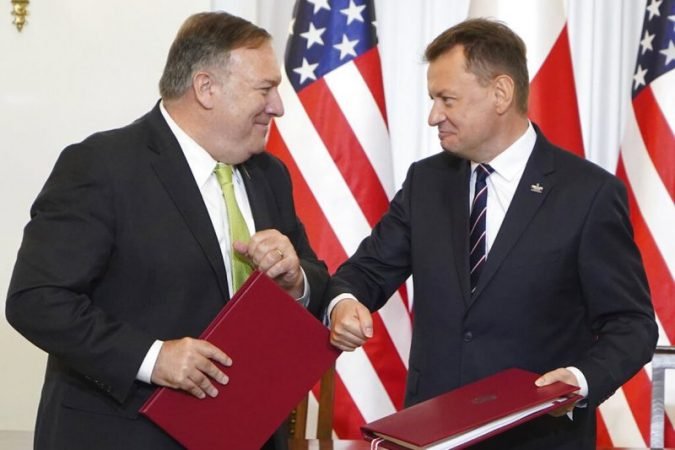Warsaw: At the heart of US-China-Russia competition; Why India should take note?

The visit of US-Secretary of State to Poland, on August 15th, 2020 underscores the growing geopolitical significance of Poland in a three-way competition between Russia, China, and the United States.
The United States Secretary of State Michael Pompeo signed a defence cooperation deal in Warsaw on Aug 15th, 2020 while India was celebrating her 74th Independence Day. Pompeo said that this pact opens the way to increasing the rotational US military presence in Poland by 1,000 soldiers from Germany in addition to the currently stationed 4500 Soldiers. Jacek Czaputowicz, the head of the Polish Ministry of Foreign Affairs, noted that the presence of American troops “enhances our deterrence because we are closer to the potential source of conflict”.
This addition of troops in Poland also comes at a time when intense protests are ongoing in Poland’s neighbouring country – Belarus, where President Alexander Lukashenko claimed victory after ‘supposedly’ winning 80.10 % votes in the Presidential elections. The protests are a result of widespread allegations of electoral fraud, with all opposition leaders appealing to Belarus Central Election commission to nullify the results. However, Kremlin confirmed through twitter that President Vladimir Putin had a telephone conversation with Belarus President-elect Lukashenko, while Pompeo was in Warsaw meeting Polish foreign Minister Czaputowicz. In these circumstances, the geopolitical significance of Poland has increased for a variety of reasons.
First, due to the growing influence and investment of China, through the Belt and Road initiative, Beijing has expanded its footprint in Eastern Europe, which Russia considers as traditionally her larger area of influence. In addition to Poland, Beijing 500 million $ line of credit to Belarus on 16th December 2019, raised doubts in Moscow that it was a move to counter Russia’s growing influence on Belarus due to the dependence of Belarus on Moscow for oil and energy. Although Russia is not publicly opposed to China’s growing influence in the region, Moscow would not like to be displaced from her influence in the region either.

Second, Poland is actively balancing the relationship with China and the United States. On the one hand, Warsaw looks towards the United States for security, receiving considerable concessions, such as the added troops, while inviting China for investment and economic development. The case of Huawei in particular, is a bone of contention between China and the United States with the Trump administration, openly seeking to dissuade allies in Europe to take a tough line on Huawei 5G networks. In Jan 2019, Poland arrested a Chinese national working for Huawei, on account of espionage, further complicating China’s ambitions of expanding in the region. The latest visit by Mike Pompeo to Poland, and providing additional troops, is seen as an attempt by Washington to nudge Warsaw, to take a tougher stand against China.
Third, Poland is exerting great diplomatic leverage within the EU, and with the United States, calling for greater involvement on account of human rights considerations in Belarus, given the ongoing protests against Lukashenko. On the other hand, Moscow views protests and instability in her immediate neighbourhood, with suspicion, and the Belarus crisis may intensify such insecurity.
From India’s perspective, these developments make it tougher to navigate the relationship with Moscow and Washington. Although India has a strategic partnership with the United States, and interest in restricting the influence of Huawei 5G, as a counterbalance to China, Russia is an important geopolitical partner in New Delhi’s calculations. During the Ladakh standoff in June, Defense Minister Rajnath Singh placed an order of 33 fighter aircraft from Moscow. Foreign Minister S. Jaishankar, recently remarked that in a cold war between China and the United States, “India will take her own side”, which was seen by many analysts as a continuation of India’s principled stance of strategic autonomy as a ‘swing power’.

Therefore, the three-way competition between the United States, China, and Russia in Eastern Europe, is of great significance to India. The contours of the relationship between India, the United States, Russia, and China depends on a tightrope balancing act of New Delhi. India getting into an alliance with the United States too early, or Russia embracing full military cooperation with China, without factoring in Chinese influence in Eastern Europe, may not only reduce the strategic space to manoeuvre for both New Delhi and Moscow, but also play into Washington and Beijing’s calculations of driving the narrative towards a bipolar world – an outcome that goes against multipolarity, which both Moscow and New Delhi espouses.



















